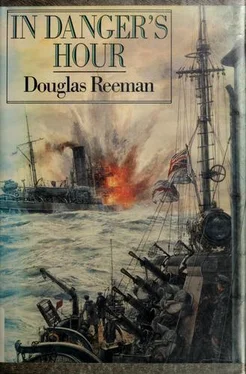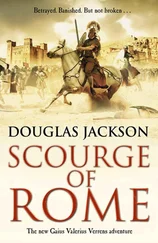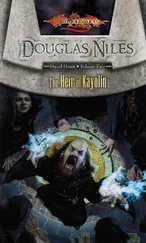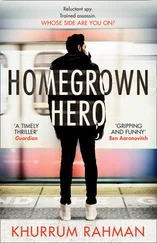Douglas Reeman - In Danger's Hour
Здесь есть возможность читать онлайн «Douglas Reeman - In Danger's Hour» весь текст электронной книги совершенно бесплатно (целиком полную версию без сокращений). В некоторых случаях можно слушать аудио, скачать через торрент в формате fb2 и присутствует краткое содержание. Город: London, Год выпуска: 1988, ISBN: 1988, Издательство: Putnam Adult, Жанр: prose_military, Морские приключения, на английском языке. Описание произведения, (предисловие) а так же отзывы посетителей доступны на портале библиотеки ЛибКат.
- Название:In Danger's Hour
- Автор:
- Издательство:Putnam Adult
- Жанр:
- Год:1988
- Город:London
- ISBN:9780399133886
- Рейтинг книги:5 / 5. Голосов: 1
-
Избранное:Добавить в избранное
- Отзывы:
-
Ваша оценка:
- 100
- 1
- 2
- 3
- 4
- 5
In Danger's Hour: краткое содержание, описание и аннотация
Предлагаем к чтению аннотацию, описание, краткое содержание или предисловие (зависит от того, что написал сам автор книги «In Danger's Hour»). Если вы не нашли необходимую информацию о книге — напишите в комментариях, мы постараемся отыскать её.
Battlecruiser
Iron Pirate
Horizon
White Guns
Sunset
In Danger's Hour — читать онлайн бесплатно полную книгу (весь текст) целиком
Ниже представлен текст книги, разбитый по страницам. Система сохранения места последней прочитанной страницы, позволяет с удобством читать онлайн бесплатно книгу «In Danger's Hour», без необходимости каждый раз заново искать на чём Вы остановились. Поставьте закладку, и сможете в любой момент перейти на страницу, на которой закончили чтение.
Интервал:
Закладка:
‘It is my belief, Mr Sherwood, Hitler wouldn’t dare!’
Mr Sherwood. Even that sounded old and quaint. Sherwood was twenty-six and had been in the navy since the beginning. His father had wanted him to wait a while. The business would not function without a younger head in the boardroom. Anyway, the war would be over by Christmas. That was four years ago.
In the club’s elegant entrance hall hung one huge chandelier, unlit now because of the black-out and power cuts. But it was a chandelier which had once been the pride of London’s clubland.
It had been made, or built as they called it in the profession, by one of the oldest chandelier companies, Sherwood’s.
It had gone during the first devastating fire-blitz on London. They had all been there, that was the worst part, his father, mother and two sisters, helping after hours, to pack some of the antique, priceless pieces which would be sent into the country for the duration. The whole street had been demolished, and the blaze had been so terrible that the firemen had been unable to fight near enough to save anyone still inside.
It was still hard to accept that life could change so completely and remorselessly. Sherwood had left the affairs of his family in the hands of a solicitor who had been his father’s friend and a cousin from Scotland he hardly knew. He could not face going back to the family home outside London in the quiet suburbs. Sherwood’s had always kept a small flat in Mayfair, for foreign buyers and the like. By some miracle it had so far avoided both the bombing and being commandeered for some deskbound warrior from Whitehall, so Sherwood stayed there whenever he was able to reach London. To many people the city was a rambling maze; to Sherwood it was sheer escape, and could have been a desert island for all the notice he took of those around him.
An air-raid siren began its nightly wail, rising and falling above the growl of traffic, with barely a passer-by glancing at the sky. It was all too commonplace. To think about it could bring nothing but dread and despair. You just kept going.
Sherwood could see beyond the thousands of servicemen of so many nationalities who thronged the cinemas, pubs and dance-halls in search of momentary enjoyment. He saw instead the people, as they went about their daily affairs almost unnoticed. People who set out each day for the office or shop by any form of transport left running after a night’s air-raid, not even knowing if the place of work would still be standing when they reached it. And at the end of their stint, returning home again, with that same gripping fear that it too might have been wiped away in their absence.
They were the real heroes, he thought. Without their courage under fire, all the sea battles and tanks in the world could not keep this island going for long.
He thought suddenly of Hargrave, their first meeting in the wardroom. Confrontation. His question about fear, his own reply about its only coming when there was an alternative. It was terribly true, but how could anybody like Hargrave understand?
Sherwood knew he was being unreasonable. Once he had tried to contain it. Now he did not care any more.
After his family had been killed he had returned to his ship and straight away had volunteered for mine disposal. He had been in Rob Roy about nine months. He had not expected to be alive this long when he had first volunteered for what they called the most dangerous work in any war.
His mind lingered on fear. That was the strange part. With him it was no act. He really did not feel it. He had supposed that one day he would either crack up completely as some had done, or make a stupid error which in the blink of an eye would have solved everything.
A dark figure seemed to slide from a doorway and he heard a girl say, ‘Hello, love, d’you feel like a go?’
Sherwood quickened his pace, angry at the interruption, the intrusion into his solitude.
She insisted, ‘Anything you like, and I’m clean!’
Sherwood caught the scent of strong perfume and sweat.
He snapped, ‘Bugger off!’
She yelled after him. ‘You stuck-up bastard! 1 hope they get you!’
Sherwood swung round. ‘ What did you say?’
He heard her high heels tapping on the pavement as she ran into the jostling figures and disappeared.
Sherwood walked on more slowly, his hands deep in his raincoat pockets.
Perhaps he should have gone with her. He almost laughed out loud. Probably end up in Rose Cottage, as they called the officers’ V.D. hospital.
He looked up and saw the tiny pinpricks of bursting flak. Soundless from here. The searchlights were groping across some clouds; it all seemed quite harmless, unreal. It was south of the Thames somewhere.
A voice said, ‘’Ere we go again. Let’s find a shelter.’
The crowd seemed to be thinning, and Sherwood found himself walking past the Ritz, beside Green Park. He had often walked there with his sisters.
He clenched his fists together in his pockets. Leave it. They’ve gone. You can’t bring them back.
Crump – crump – crump – the familiar sound of shell-bursts, nearer now. More casualties, more smashed debris where streets had once stood and survived the years.
Like the times when he had been sent to deal with the parachute mines dropped on congested towns and seaports. Every street was always cleared beforehand. Just the Unexploded Bomb sign, his rating assistant, and utter desolation. As if every living thing had been spirited away.
He had never got over the feeling that he was intruding. The Marie Celeste atmosphere of meals from precious rations left steaming on tables, letters half-read or partly written. Mantelpieces with their framed pictures of dear ones in uniform. Sons, husbands, lovers. And always below the tell-tale damage, the huge, deadly mine hanging from its parachute.
Intrusion. That summed it up better than anything. What war was all about.
A voice said sternly, ‘Just a moment, sir.’ A policeman in a steel helmet stepped from his little sandbagged observation post.
Sherwood peered at him through the gloom, saw the helmet reflect a couple of the shell-bursts. It was strange, but you never got used to seeing a London bobby in a tin hat.
‘Yes?’
The constable said, ‘Air-raid, sir. There’ll be some shell splinters dropping about soon. It’s not safe to walk the streets. Your cap won’t stop the stuff.’
Sherwood thought of the ships he had watched being blown up or strafed, of Fawn and her broken, pathetic survivors.
He replied, it’s the war, I expect.’
He walked on and the policeman muttered to himself, ‘Another bloody hero!’
By the time Sherwood reached the street where the company flat was installed he had guessed that the raid was heading further away, to the City or East London perhaps.
He heard the far-off crash of bombs and the familiar rumble of collapsing buildings. As he climbed the stairs to his flat, the streets came alive with other sounds. It was like a mad symphony, he thought. The clamour of fire-engine and ambulance gongs, taxis roaring down side-streets, not with passengers this time, but “towing small pumps as a part of the auxiliary fire service. It was as if the whole of London was putting its weight against the enemy. Nobody was spared. And yet when another smoky dawn laid bare the ruins, these same ordinary people would go about their daily tasks. Make the best of it.
Sherwood threw his cap on the bed and prepared himself for the night. He took a bottle of gin from a cupboard, one glass and a rare lemon he had brought from the ship.
Then he hung his jacket on a chair and glanced around the flat. As it was in Mayfair, he supposed it was worth a fortune. But it was for visitors who came and went without caring too much about the decor. It was dull, without personality.
Читать дальшеИнтервал:
Закладка:
Похожие книги на «In Danger's Hour»
Представляем Вашему вниманию похожие книги на «In Danger's Hour» списком для выбора. Мы отобрали схожую по названию и смыслу литературу в надежде предоставить читателям больше вариантов отыскать новые, интересные, ещё непрочитанные произведения.
Обсуждение, отзывы о книге «In Danger's Hour» и просто собственные мнения читателей. Оставьте ваши комментарии, напишите, что Вы думаете о произведении, его смысле или главных героях. Укажите что конкретно понравилось, а что нет, и почему Вы так считаете.












